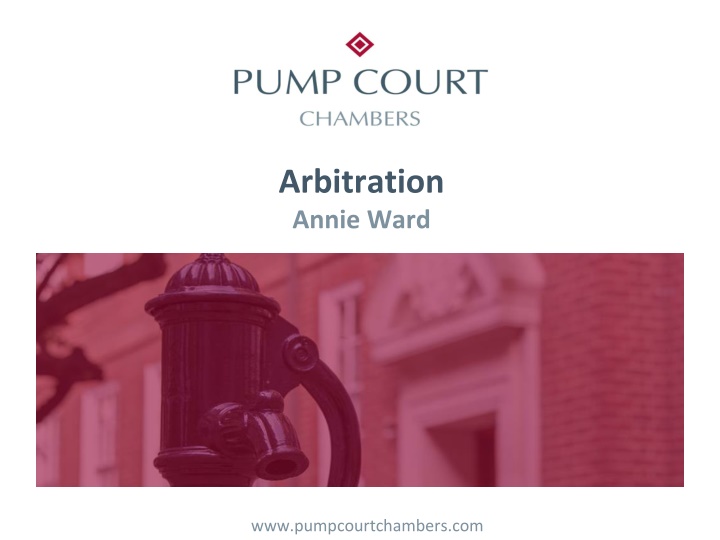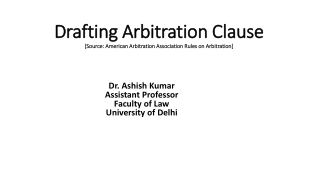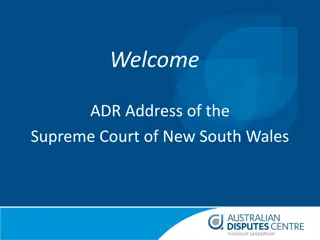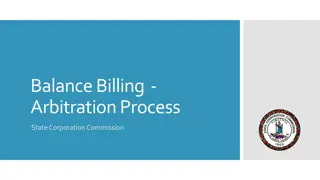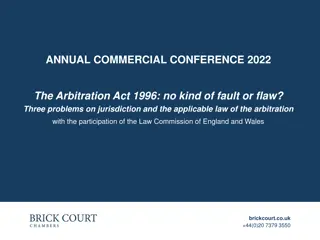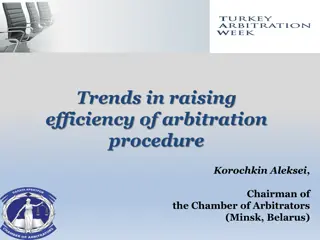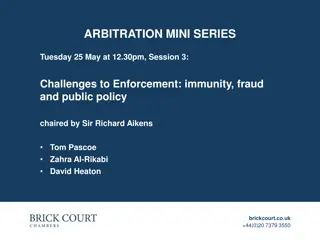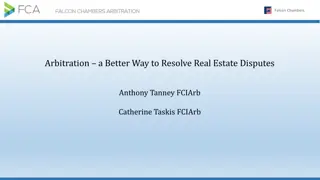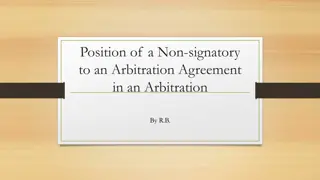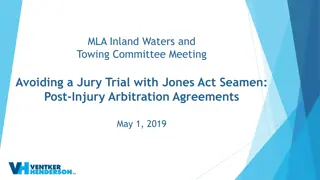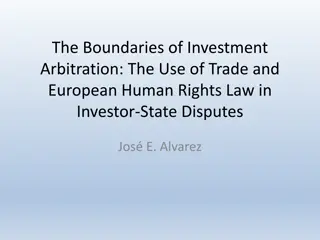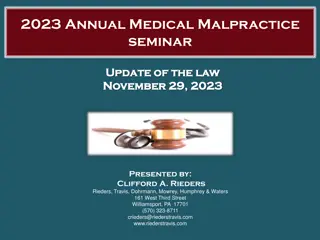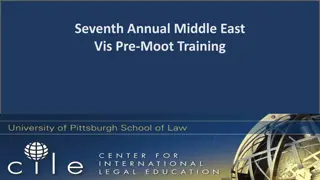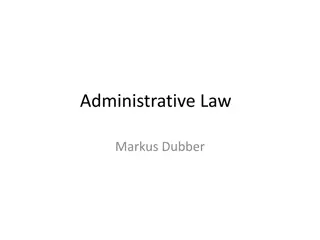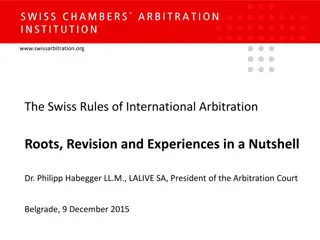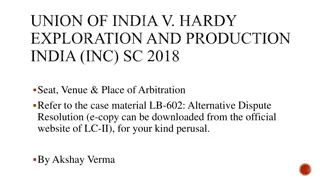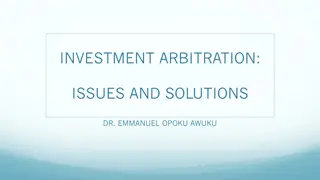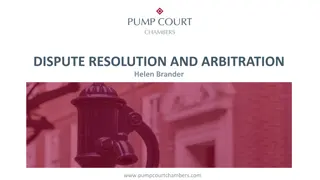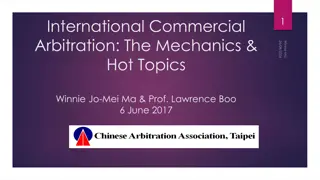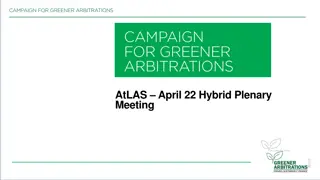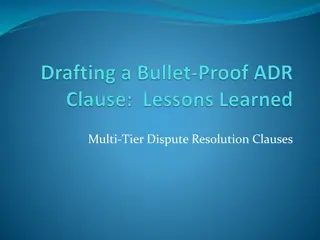Arbitration
The Arbitration Act of 1996 emphasizes fair dispute resolution through arbitration, offering a quicker, cheaper, and confidential alternative to litigation. Explore the process, consent requirements, and IFLA rules for family arbitration in various legal disputes.
Download Presentation

Please find below an Image/Link to download the presentation.
The content on the website is provided AS IS for your information and personal use only. It may not be sold, licensed, or shared on other websites without obtaining consent from the author.If you encounter any issues during the download, it is possible that the publisher has removed the file from their server.
You are allowed to download the files provided on this website for personal or commercial use, subject to the condition that they are used lawfully. All files are the property of their respective owners.
The content on the website is provided AS IS for your information and personal use only. It may not be sold, licensed, or shared on other websites without obtaining consent from the author.
E N D
Presentation Transcript
Arbitration Annie Ward www.pumpcourtchambers.com
The Arbitration Act 1996 S.1 provides: (a) The object of arbitration is to obtain the fair resolution of disputes by an impartial tribunal without unnecessary delay or expense (b) The parties should be free to agree how their disputes are resolved, subject only to such safeguards as are necessary in the public interest (c) The court should not intervene except as provided for in this part
Arbitration Act 1996 Therefore the aim of arbitration compared to litigation is that is it is: a) Quicker and (hopefully) cheaper, and b) a process over which the parties have control. They own the process and can choose what procedure is adopted, and c) Confidential (which is different from civil proceedings in court)
A way to avoid mediation! By now mediations are the almost universally accepted way of jumping through the ADR hoop. However, not all cases are suitable for mediation. Sometimes an agreement is never going to be reached. A decision has to be imposed. In those cases, suggest arbitration. It is a recognised form of ADR and so complies with your obligation to try and avoid litigation, but it has the same degree of finality as litigation.
Family Arbitration (Financial) Arbitration has long been a feature of dispute resolution in the commercial world. The IFLA rules (Institute of Family Law Arbitrators) were devised to provide a specific framework for the conduct of family law arbitrations. The rules cover these types of disputes: 1. Matrimonial finance/civil partnership 2. Children Act 1989 Schedule 1 3. Trusts of Land and Appointment of Trustees Act 1996 4. Inheritance (Provision for Family and Dependants) Act 1975 5. Matrimonial and Family Proceedings Act 1984 Part III
Form ARB1FS Arbitration can only happen with the consent of the parties. That consent, and the basic procedural framework which is to be adopted, is contained in Form ARB1FS. By signing this form the parties: a) bind themselves to the process b) Choose the Arbitrator (or the mechanism for choosing them) c) Outline the scope of the dispute - IMPORTANT d) Agree to conduct the arbitration in accordance with the IFLA rules e) Agree not to start, or to stay, any court proceedings f) Agree to convert the arbitral award into a court order g) Choose which costs principles will apply
IFLA Rules (7th ed, 2021) 17 Articles. Of note are: Art 4.6 a party may be represented by a lawyer or other person chosen by him . However by Art 4.7 the Arbitrator can exclude any such person who unreasonably impedes or is likely to impede the conduct of the arbitral proceedings Art 7.2 the arbitrator can make all the orders a High Court judge can, except committal orders, interim injunctions and orders over third parties (unless they consent) Art 8.1 the arbitrator will decide all procedural and evidential matters subject to the right of the parties to agree any matter , but Art 8.3 does give the arbitrator the power to limit expert evidence Art 9 the parties are free to agree as to the form of procedure and in particular to adopt a documents only procedure if there is no such agreement, the arbitrator will have the widest possible discretion Art 12 provides a version of normal process of disclosure i.e. exchange of Forms E (a financial disclosure form from matrimonial proceedings) and questionnaires, requests for valuations etc. The parties can request a directions hearing with the arbitrator by telephone or in person in order to finalise the scope of the evidence
Hearings The standard procedure is as follows: 1. Parties sign the ARB1FS and appoint the Arbitrator 2. The Arbitrator writes to the parties and canvasses views as to procedure 3. A directions hearing is arranged, at the end of which the arbitrator makes an order setting out how the rest of the arbitration is to be conducted 4. The parties follow the directions and produce their evidence and proposals 5. The dispute is resolved either by attendance at an arbitration to give oral evidence, or by the arbitrator conducting a documents only arbitration. They write up an award (a judgment) which contains the form of an order 6. The parties convert the decision into a court order and submit it for the court s approval.
Appeals One of the issues that creates most concern about arbitrations is the belief that you cannot appeal the outcome. In fact the ability to challenge an arbitral award is contained not within the IFLA rules but with the Arbitration Act itself. The grounds are: 1. That the arbitral tribunal did not have substantive jurisdiction to make the award (S.67) 2. That there was a serious irregularity affecting the proceedings, the tribunal or the award (S.68). Examples of serious irregularity are: failure to deal with all the issues, failure to adopt the procedure which had been agreed, uncertainty or ambiguity of the award. 3. On a point of law (S.69)
Appeals If these grounds can be made out then an application for permission is made to the court. If permission is granted, the court can: 1. Remit the case to the arbitrator for reconsideration 2. Set the award aside in whole or in part 3. Declare the award to be of no effect No application may be made until the party has exhausted the routes of seeking to go back to the arbitrator seeking the correction of the award, or an additional award.
Appeals - Haley In Haley v Haley [2020] EWCA Civ 1369 the Court of Appeal confirmed that appeals from arbitration awards in family cases should be treated in exactly the same way as appeals from judicial decisions. It remains to be seen what would happen to a similar case within the CPR (i.e. the TLATA and 1975 Act cases), but the authority would be persuasive. In general the court system really wants to encourage and support the arbitration process and this decision was designed to neutralise the concern that many litigants had about not being able to appeal.
Costs The ARB1FS in its standard form provides that the parties agree to be bound by the IFLA rules. Art 14 of the IFLA rules provides that unless otherwise agreed the general rule is that the parties shall bear the costs of the arbitrator equally, and that there will no order requiring one party to pay the costs of the other party. For costs to come out of the estate, the arbitrator will only be able make an order if any non-party residuary beneficiaries and executors have agreed to abide by whatever award the arbitrator makes. The arbitrator has a discretion to make a different award in accordance with the criteria (which are identical to the Part 28 criteria).
Why arbitrate? Arbitration Litigation Duration: you could go from ARB1FS to a consent order in a matter of week Duration: Claim form to final order at a final hearing about a year, could be more in some courts. Costs: One year of litigation in a normal medium money case can easily see costs of 50,000. Three court hearings, no control over disclosure, no control over the Costs: Shorter duration means less correspondence, fewer court appearances, fewer brief fees. Bespoke procedure means the evidence can be tailored to that which is relevant timetable Tribunal: you choose someone you know to be competent and specialist Tribunal: you may get an excellent specialist practitioner with nothing else in their list. Or you may get a PI specialist with another 20 cases to do.
Why arbitrate Arbitration Litigation Process: you choose your judge, your venue, your procedure. You are not competing with other cases. Process: unsatisfactory court buildings, disorganised lists, unpredictable judges, chaotic court offices, lost documents. Result: no extempore judgments. The arbitrator will take time to write a careful award with no gaps . Ideally they will set a date when the award will be sent out Result: grumpy tired judges who know they have a full list the next day will give an extempore judgment and can make mistakes. Post result complications: email the arbitrator. They will email you back and do their best to sort the problem within the shortest possible time frame. If there are issues on the drafting of the order, the court seems to give a quick listing (quicker than if you were in normal court Post result complication: write to the court. About three weeks later they will tell you to make an application. Pay your issue fee. About 2 months later you might get a 15 minute hearing. The judge says he does not have the time to deal with a complicated application. It is set down for a proceedings) hearing in 3 months.
Case Law S v S [2014] EWHC 7 (Fam) Munby P: 1. Applications for the approval of consent order which enshrine arbitral awards are made in the urgent without notice applications list before a High Court Judge. As long as the documentation had been lodged with the judge the day before, the hearing should not take more than 10 minutes. 2. If one party is seeking to resile from the award, the other party should adopt the Notice to Show Cause procedure. The court will no doubt adopt an appropriately robust approach the parties will forfeit the right to anything other than the most abbreviated hearing
Case Law DB v DLJ [2016] EWHC 324 (Mostyn J) This is the first authority dealing with an application to resile from an arbitration award on the basis that a property retained by the Wife fell in value after the award was made because of a planning issue. The authority helpfully identifies that although the grounds for challenging an award by way of appeal are very limited (now superceded by Haley), the routes of applying to set aside/appeal an award on the basis of a Barder event/mistake remain open to the parties in addition to the Arbitration Act 1996 grounds (but would this apply to a 1975 Act case?).
CM v CM [2019] EWFC 16 Decision of Moor J in which he encouraged the use of arbitration to resolve single issue disputes within proceedings. The parties could not agree on the wording of a letter of instruction to an expert. Waiting for a court hearing would derail the final hearing date and lead to significant delay. The parties should have given that single dispute to an arbitrator in order to keep the trial date
Practice Guidance Munby P issued practice guidance dated 23rd November 2015 which sets out: 1. How to stay existing court proceedings once the Form ARB1FS has been signed 2. How to apply for an order to be approved, whether such an application is by consent or opposed (new standard orders were produced in 2018, and the current compendium of standard financial remedy orders contains an arbitration recital which could be cut and pasted onto a 1975 Act order) 3. How to apply to challenge an award (but now see A v A [2021] EWHC 1889 which gives detailed guidance on which forms to use) 4. How to enforce an award 5. How orders should be drafted
How Can We help? We provide the arbitrator (Leslie Samuels K.C. and myself are currently both arbitrators and 1975 Act specialists) We can arrange the venue: we can accommodate arbitrations in both London and Winchester chambers (the main room and break out rooms for each party), or you can use a neutral location such as the IFLA offices in Bloomsbury Sq or hired conference facilities, a swanky hotel, your own offices. We can negotiate a flat fee to include a directions hearing, the hearing itself and the writing of the award. We can liaise with all parties to agree the dates This is a bespoke process, whatever the clients think is appropriate can be arranged. No reason why it couldn t be at the weekend (except my fee will be at least double)
More information www.ifla.org.uk www.familyarbitrator.com www.resolution.com www.ciarb.org
Private FDR/ENEs The parties can agree that the process can be a hybrid FDR/mediation, for example: Parties attend at 10 am, both sides make submissions 12 noon the indication is given The parties attempt to settle in the usual way, if there are outstanding issues then at 2pm the ENE judge can act as a mediator to try and narrow those issues and bring the parties to an overall settlement by the end of the day The settlement is drawn up and signed in the usual way and the parties submit the order for the court s approval.
Benefits of private ENE/FDRs You choose your judge You choose your date and venue You choose at what stage in the disclosure process it should happen. This helps to control costs. You can do more than one They are lower risk than arbitrations as the judge has no power to impose anything upon the parties. They do not involve staying other proceedings so they do not cause delay They are private and confidential You could choose to conduct a documents only ENE/FDR in order to reduce costs
Why are these developments happening? Because the government is committed to the reduction of expenditure on the courts service Because the increasing costs and delay of litigating do not provide a system which is fair or civilised or sustainable Because clients should be able to opt out of litigation and choose a better process Because the challenge to the confidentiality of family proceedings is a real issue for some clients Because lawyers are realising they can provide a much better service by using these bespoke methods of dispute resolution Because if the professions work together to provide a better private system then we protect our incomes and our market for the future
